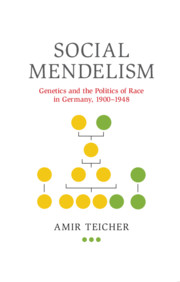Book contents
- Social Mendelism
- Social Mendelism
- Copyright page
- Dedication
- Epigraph
- Contents
- Figures
- Acknowledgments
- Abbreviations
- Introduction
- 1 Mendel’s Laws and Their Application to Humans, 1865–1913
- 2 Mendelism Maturing: From Experimental to Interpretative Framework, 1913–1933
- 3 Mendelism, Purity and National Renewal
- 4 Annihilating Defective Genes: Mendelian Consciousness and the Sterilization Campaign
- 5 Mendelizing Racial Antisemitism
- Epilogue: Social Mendelism beyond the Nazis
- Bibliography
- Index
Epilogue: Social Mendelism beyond the Nazis
Published online by Cambridge University Press: 03 February 2020
- Social Mendelism
- Social Mendelism
- Copyright page
- Dedication
- Epigraph
- Contents
- Figures
- Acknowledgments
- Abbreviations
- Introduction
- 1 Mendel’s Laws and Their Application to Humans, 1865–1913
- 2 Mendelism Maturing: From Experimental to Interpretative Framework, 1913–1933
- 3 Mendelism, Purity and National Renewal
- 4 Annihilating Defective Genes: Mendelian Consciousness and the Sterilization Campaign
- 5 Mendelizing Racial Antisemitism
- Epilogue: Social Mendelism beyond the Nazis
- Bibliography
- Index
Summary
While Social Mendelism certainly gained its most explicit manifestations in Germany under the Nazi rule, many of its underlying assumptions were shared by scholars and social reformers elsewhere. Moreover, the legacy of Social Mendelism did not suddenly disappear with the collapse of the Third Reich. The efforts made by German eugenicists to continue the sterilization campaign in the immediate postwar years attest to the persistence of Mendelism as a legitimizing framework after the war. Moreover, they show that a racial-antisemitic worldview continued to inform eugenic efforts, under the guise of nonideological Mendelian thinking. The story, then, does not sit comfortably within the boundaries of the 1900–1945 timeline. Neither is it a purely German story. There were great national differences in the way Mendel’s theory was received, adopted and applied, and in some nations its influence was marginal. But in others, like the US and Britain, it had great social and cultural impact. Thus, the present image of Mendelism as a no-ideological, possibly even anti-racist theory, is no more than a mirage, consciously construed after World War II in the context of the emerging Cold War politics.
Keywords
- Type
- Chapter
- Information
- Social MendelismGenetics and the Politics of Race in Germany, 1900–1948, pp. 205 - 231Publisher: Cambridge University PressPrint publication year: 2020

